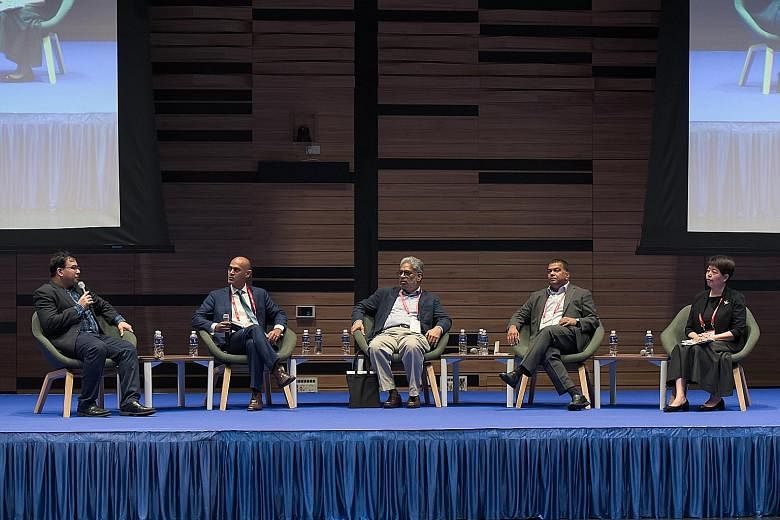The historic summit between the United States and North Korea in Singapore has set the stage not just for the denuclearisation of the Korean peninsula, but also the rise of a new structure of international relations in North-east Asia, said a prominent foreign policy expert.
The possibility of reconciliation between North and South Korea means that China must deal with its waning influence over the North, while Japan has to come to terms with Korean nationalism, Institute of South Asian Studies director C. Raja Mohan said yesterday.
The two giants will have to figure out what their new roles in the region should be.
"There needs to be a local balance of power," Professor Mohan said on the second day of the East-West Centre's International Media Conference on the theme "What Is News Now?".
"America is not going to sit in the middle and try and do everything."
The changing world order came under scrutiny during a panel discussion on Asian geopolitics, as speakers delved into how issues, such as the US threats of a trade war and the rise of Chinese capitalism will impact the region.
US President Donald Trump has steered his country away from globalisation, turned his nose up at the idea of open borders and baulked at "paying for allies who are rich and can do it themselves", noted Prof Mohan.
The challenge for Asian countries is to live with this new reality in Washington and find ways of adapting to the structural change Mr Trump is demanding, he added.
"We had the luxury of expecting the Americans to do the heavy lifting, and the luxury of criticising them for doing exactly that," said Prof Mohan.
"In some senses, Trump has given us a wake-up call. We can't just leave our fortunes to America to deal with. We have got to do more to pitch in for our own regions, for our own security. We have got to pick up the slack."
Mr Zakir Hussain, foreign editor of The Straits Times, noted that the US withdrawal from the Trans-Pacific Partnership free trade pact has given new impetus to the Regional Comprehensive Economic Partnership (RCEP).
Conceived in 2012, RCEP aims to harmonise trade rules across the 10 Asean countries and six of their trading partners: China, Japan, India, South Korea, Australia and New Zealand.
Leaders of RCEP have resolved to wrap up talks on the pact this year, to show the region's commitment to lowering barriers to trade.
"If that goes ahead, it will send a strong signal that trade wars really shouldn't have a place in the region," said Mr Hussain.
As America looks inwards, China has ventured out into the world.
Professor Wu Minsu of the Communication University of China hopes the world will also be more open to learning about China and getting information on it from the Chinese - not Western - media.
Dr Satu Limaye, director of the East-West Centre, said that Asean centrality remains a core US policy objective, noting how Mr Trump met the leaders of four South-east Asian countries in Washington within his first year in office.
Mr Hussain added that none of the Asean countries wants to be put in a position of having to choose between the US and China.
"I think the next few years could see some space for Asean to be a platform where not only China and the US, but also India, Japan and Australia come together... Even though the US is somewhat pulling back from its involvement in the region, there is space for greater cooperation and partnership on other issues," he said.
At another panel session titled "New Indo-Pacific Policy", US State Department official Walter Douglas pointed out that America has a large presence in Asia, ranging from embassies to Peace Corps and United States Agency for International Development branches, and is here to stay.
"There is a large American presence out here, it is not going away. In fact, it is probably growing, and we are going to be here for a long time," said the Deputy Assistant Secretary of State for Public Affairs and Public Diplomacy.
• Additional reporting by Charissa Yong

